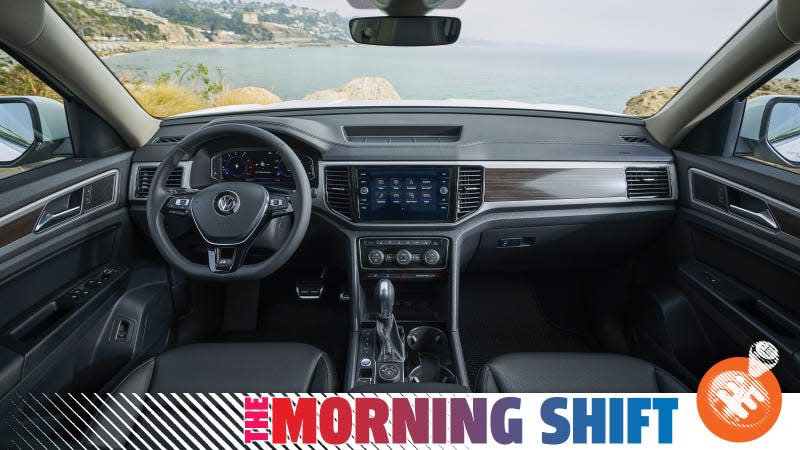143,000 Volkswagen Atlas Passenger Seats Are Off Limits Until Further Notice

Volkswagen has a big recall on its hands for its biggest SUV, Kia has big plans for the future buoyed by its recent triumphs and Stellantis CEO Carlos Tavares made big money in 2022, perhaps too much. All that and more in this edition of The Morning Shift for Wednesday, April 5, 2023.
1st Gear: Do Not Sit
Nobody should sit in the front passenger seat of a Volkswagen Atlas while the vehicle is in motion, according to the National Highway Traffic Safety Administration. That’s because the wiring for the sensor that detects whether an occupant is present could be faulty, which means the airbag may not deploy in the event of a crash. From Reuters:
Read more
The recall covers 2018-2021 model year Atlas and 2020 model year Atlas Cross Sport vehicles, and relates to potential faulty occupant-detection systems in front passenger seats.
The passenger occupant-detection system may experience a fault in the wiring, which could deactivate the front passenger air bag even when the seat is occupied. A deactivated air bag will not deploy in the event of a crash, increasing the risk of injury to the front seat passenger, NHTSA said.
Volkswagen said it is currently developing a remedy, which it expects to be ready likely in late 2023. VW in late 2020 introduced a new cable to address potential issues with the system.
This recall accounts for 143,000 Atlases built over a period of four years, going back to the very first model year in 2018. Apparently Volkswagen began investigating the problem way back in 2019. Two years later, it reported “field data analysis indicates that the failure is highly sporadic and the warning light is illuminating immediately upon failure.”
The automaker says it hasn’t been informed of anyone having been injured as a result of this defect. If the fix isn’t ready until “late 2023,” owners are looking at a good, what — six months without a usable passenger seat, having to chauffer everyone around in the second or third row? Six painfully awkward months.
2nd Gear: Kia’s Dreaming Big
Those KN cars are proving very popular, and it’s that momentum that has spurred Kia along to set a target for itself. CEO Ho Sung Song wants to see half of the brand’s global sales originating from electrified vehicles by 2030. That actually seems like a pretty reasonable goal. Via Automotive News:
The automaker wants to sell 2.38 million full-electric and hybrid vehicles in 2030, he said.
That represents a 300,000-unit increase over Kia’s target from last year.
EVs will account for some 1.6 million of those vehicles in 2030, as Kia expands its full-electric lineup to 15 models by 2027, Song said.
Following the introduction of the popular EV6 hatchback, Kia plans to release the EV9 three-row all-electric crossover this year as the brand’s new flagship.
Also on tap in the midterm is the smaller EV5 crossover, Kia said.
Kia expects to sell 258,000 EVs worldwide in 2023. The revised 2030 EV sales target represents an increase over the 1.2 million goal Kia had set for worldwide EV sales just last year.
To supply the coming EV surge, Kia will open its first dedicated EV factory next year in Gwangmyeong, outside Seoul.
In the U.S., Kia will also produce key EV models locally, beginning 2024. Kia said it will also produce small and midsized EVs in Europe.
Of that electrified half, Kia still plans battery-electric vehicles to comprise 37 percent of sales globally — up from 8 percent in 2023. That’ll certainly be much easier to realize once the brand gets its future U.S. facility churning out products, to benefit from federal tax credits.
3rd Gear: Did Carlos Tavares Make Too Much Last Year?
That’s the question two advisory firms are attempting to settle for Stellantis shareholders. One said the CEO’s $25.8 million payout including bonuses were “in line with market practice,” but admitted that the criteria is vaguer than it should be, while another came out against Tavares’ generous pay package. From Reuters:
Institutional Shareholder Services (ISS) has recommended a vote in favor, while Glass Lewis said shareholders should vote against it according to reports seen by Reuters on Tuesday.
Tavares’ total compensation for 2022 was almost 23.5 million euros ($25.8 million), including long-term compensation. Stellantis said his cash and vested equity awards was 14.9 million euros ($16.3 million), 13% lower than the previous year.
In its report, ISS said the proposed remuneration was in line with market practice, but raised concerns including for a “lack of clarity regarding the key perquisites allocated to both the CEO and chairman.”
ISS said concerns also remained about some incentives introduced in 2021. Despite no payout in the past fiscal year, if performance targets were achieved, they could lead to a 40 million euro payout, at current market value, on top of the CEO’s existing pay package.
It “may be considered excessive once vested,” it said.
Glass Lewis said Tavares’ “total pay opportunity and realized pay appear to exceed most European peers.”
Glass Lewis cited some improvements in disclosures of Stellantis’ executive compensation, but said shareholders may rightfully expect “further, more comprehensive improvements” to that process.
Tavares and Stellantis are no stranger to being dragged by investors for paying the big boss too much. They came under fire in 2022 for similar reasons, resulting in more than half of all voting shareholders rejecting the proposed renumeration for senior managers. Given that this is the second year in a row vested parties are having this discussion, I’m going to go out on a limb here and say there’s a case to be made.

 Yahoo Autos
Yahoo Autos 